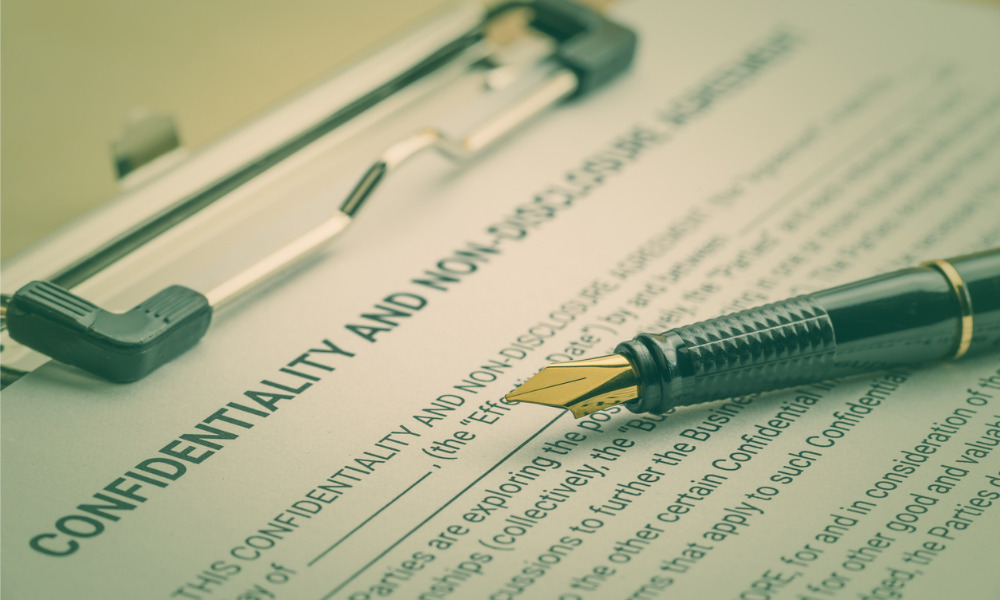
Agreements create 'toxic environment,' says lawyer, and should only be used to protect intellectual property

Canadian lawyers are looking to help victims of workplace harassment and abuse speak up about their experiences and find justice under the law.
Looking to end the misuse of non-disclosure agreements (NDAs) in the workplace, the Canadian Bar Association has vowed to advocate and lobby for legislation and policies around the agreements at the federal, provincial and territorial levels.
"It's up to the legal profession to understand the impact of these agreements, so the negative effects are minimized," said Jo-Anne Stark, Vancouver lawyer, in a CBC report.
On Thursday, the association passed by a margin of 94% a resolution – put forward by Stark – pushing to prevent NDAs from being used to silence those who come forward after experiencing abuse, harassment and discrimination, and instead focus on being “a method to protect intellectual property.”
"NDAs have become a default in settlement agreements for the last decade, and this shows that a rethink is taking place," said Julie Macfarlane, a professor emerita in the law department at the University of Windsor and co-founder of the Can't Buy My Silence campaign.
Previously, Prince Edward Island became the first jurisdiction in Canada to limit the use of NDAs in cases of discrimination and harassment.
Stark also hopes the resolution will inspire companies to review policies within their organizations.
"People are going to have to look at their policies about what happens with these complaints, making sure the victim is getting the support they need and making sure their documentation is in alignment," she said in the CBC report.
An NDA is a legal binding contract that ensures the parties involved are bound to keep certain information confidential.
While NDAs are typically used to protect trade secrets in the workplace, it has evolved into a common tool to silence victims and protect perpetrators, according to Canadian lawyers. This leaves employers in the dark about an employees’ past misdeeds, and prevents survivors from speaking with family, friends and therapists about their experiences.
"They've become much more pervasive and almost like a boilerplate clause in a lot of agreements," Stark said in the CBC report. "It creates, in the end, almost a toxic work environment."
At the Thursday general meeting of the CBA, some of the Canadian lawyers shared that they have clients who contacted them years after signing an NDA, asking whether they had any options to be freed from their contract as they did not fully understand the paperwork when they signed.
Others also expressed frustration after hearing stories of perpetrators, protected by NDAs, who continued to perpetrate abuse and escape accountability.
NDAs should not exist in situations where there have been allegations of sexual misconduct, harassment, discrimination and other forms of injustice, Macfarlane said in the CBC report.
"All kinds of things today are being hidden in non-disclosure agreements which are not trade secrets," she said. "They're just bad things that one of those two parties doesn't want the public to know about."
In August 2022, amid the public outcry over Hockey Canada’s handling of sexual assault claims, a Manitoba lawmaker proposed legislation to limit the use of NDAs in federally regulated workplaces.
Movement against the improper use of NDAs is also growing outside of Canada.
At the start of 2022, California’s SB 331 CH 638 took effect. The legislation prohibits an employer from adding a provision in certain agreements that denies disclosing information about harassment, discrimination or other unlawful conduct in the workplace.
In March last year, legislators from Washington passed House Bill 1795, dubbed the "Silenced No More Act", which targets NDAs that attempt to silence harassment and discrimination in workplaces.
Months later, the Victoria government in Australia announced that it is considering restricting the use of NDAs for workplace sexual harassment cases, among other steps to protect employees in workplaces.
Read more: Employee NDA in Canada: The Basics for Employers and Employees